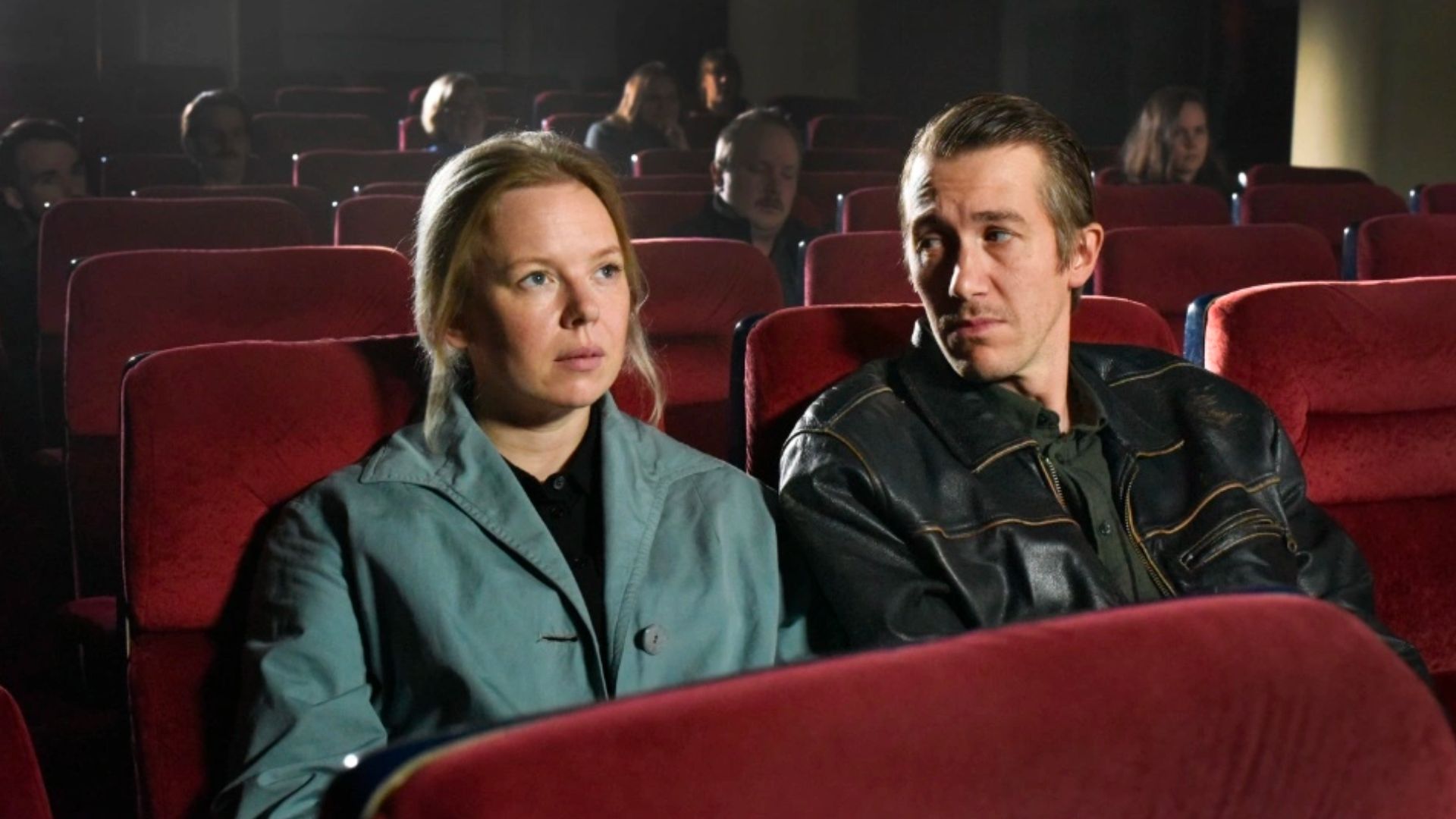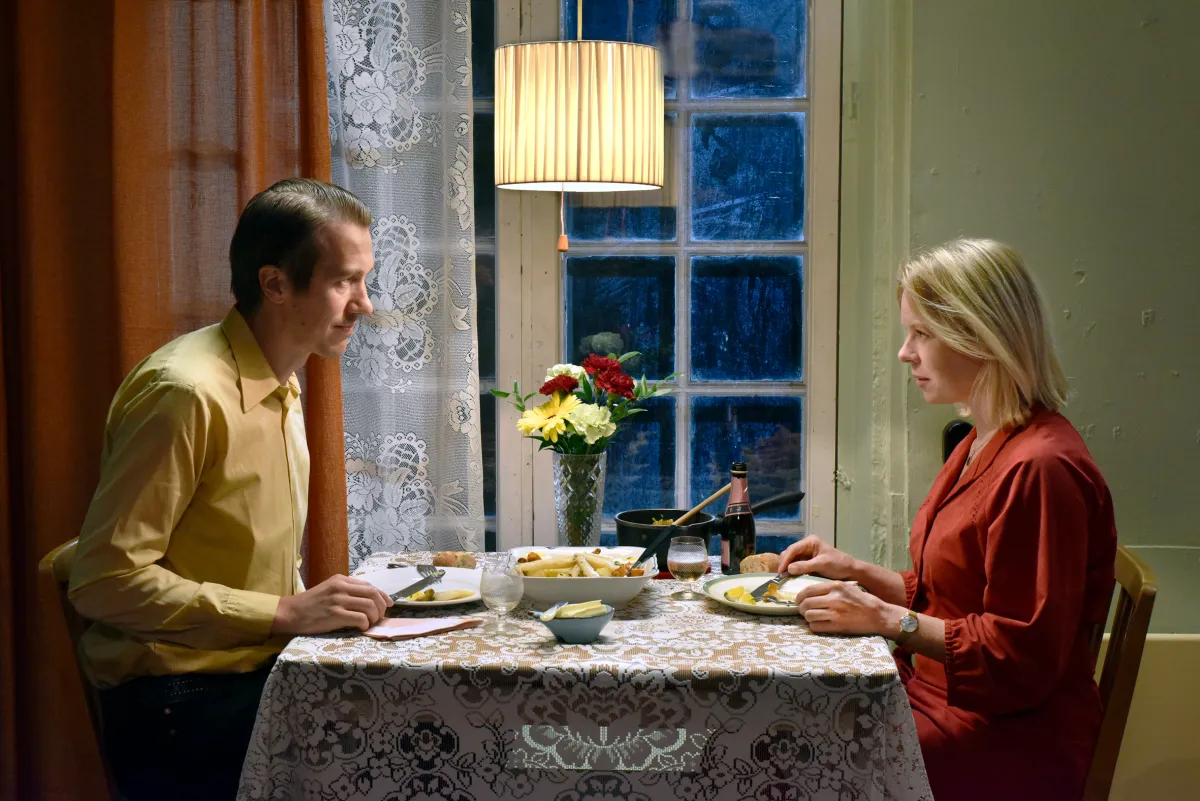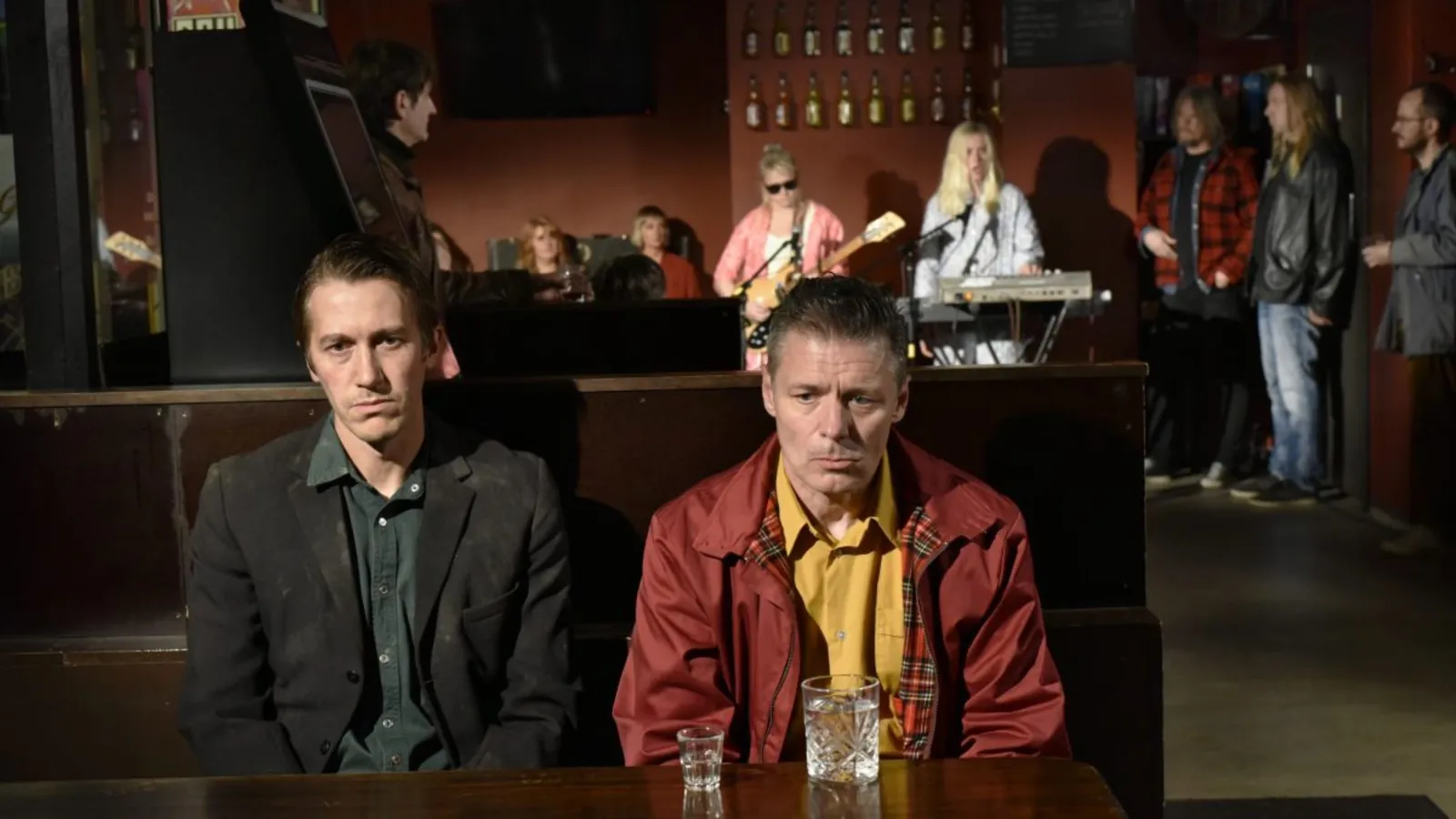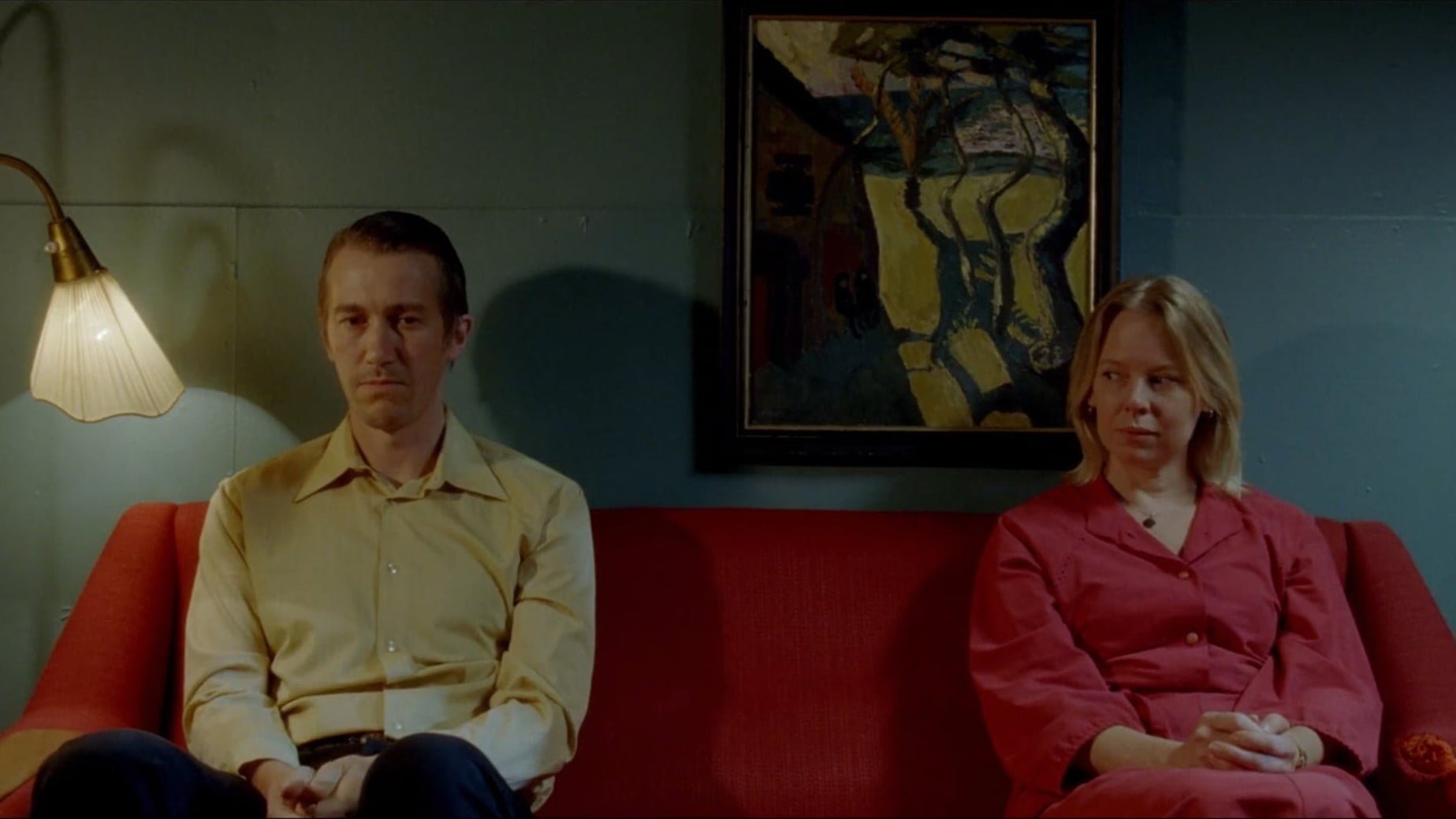There is something very feel good about the film Fallen Leaves, written and directed by Finnish filmmaker Aki Kaurismaki, that recently won the Jury Award at the Cannes International Film Festival, but you won’t easily be able to put your finger on it. The film, set in present-day Helsinki, revolves around two characters – Ansa (Alma Poysti) and Holappa (Jussi Vatanen) – whose paths cross again and again.
The film, set in present-day Helsinki, revolves around two characters – Ansa (Alma Poysti) and Holappa (Jussi Vatanen) – whose paths cross again and again.
Yet, the only giveaway that it is set in contemporary times is the news of the Russia-Ukraine war that streams in from radios all through the film. It is a love story between Ansa and Holappa, both from the working class, navigating the precarity of employment in Finland’s capital city. They meet – or their eyes meet – at a karaoke bar after their work day is over, each having a drink with a friend. Their story unfolds through lost phone numbers, missed meetings, and the simultaneous dread and excitement of a new romance.
Kaurismaki’s style
Aki Kaurismaki’s films have a reputation for being very minimalist in appearance. In the absence of any visible traces of the busy-ness of a life, Kaurismaki is able to turn the audience’s attention towards the many uncomfortable emotions that we are perpetually trying to dull out via our phones and other distractions. It’s no coincidence then that mobile phones don’t form a part in any of the scenes in Fallen Leaves. The characters don’t text, they don’t really call either unless urgent, and it’s interesting that Kaurismaki doesn’t locate this urgency in everything, going against the haste that makes up much of one’s life today.
It’s almost as if he doesn’t trust that the many props holding up contemporary life can allow him to tell his story. In one of his interviews in 2012, Kaurismaki had responded to a question on whether he’d now make digital films which much of the industry has started doing, by saying he would die with his boots on. That is, he wouldn’t make a digital film in his life. In 2014, he rescinded his comments and in an open letter reluctantly wrote that ‘in order to maintain my humble film oeuvre accessible to a potential audience’, he was going to render them in digital.
However, his reluctance comes through in the way he designs his films, its spartan spaces and frugal dialogues. It seems like he is registering his protest against the direction he is having to take, while also acknowledging the nature of his rebellion: ‘however, those things are only noticed by change-resistant old codgers hobbling by the grave like me, whose opinion does not count anyway in our ever-improving world in which the experiences of yesterday is a burden for tomorrow.’ He also confesses that he plans to continue using 35 mm film until he is able to.
After their first meeting at a karaoke, a series of unfortunate events keeps them apart for a while.
His dry sense of humour is also evident in the dialogues of Fallen Leaves that he himself has penned. He attempts to articulate comedy in the tragic, and the tragedy of the comic through a crisp storyline. After their first meeting at a karaoke, a series of unfortunate events keeps them apart for a while. Ansa loses her job at a supermarket, without any initial regret, but then finds out she doesn’t have money to pay her electricity bill. So, she takes up a job as a cleaner at a pub that Holappa frequents. He is drunk, sleeping at a bus stop, when Ansa notices him for the first time after their meeting at the karaoke bar. She is leaving for home after her work day, and looks at him longingly as she boards her bus home.
Precarious lives in Fallen Leaves
But their precarious employed lives keep bringing them closer. Ansa’s boss is arrested because of a drug racket, and she runs into Holappa there who has come to the bar in the morning for a beer. They go for a Jim Jarmusch film (Kaurismaki is an avid Jarmusch film viewer.) The film they go for is The Dead Don’t Die, a zombie horror comedy that makes Ansa laugh like never before. This is a second giveaway that suggests Fallen Leaves is set in present times. Interestingly, Jarmusch had played a cameo in one of Kaurismaki’s most acclaimed films Leningrad Cowboys Go America. The two then decide to meet again. She gives him her number the old-fashioned way, and in the old-fashioned way, he proceeds to lose the scrap of paper.
The anxiety of the Russia-Ukraine war is palpable in bursts through the film, streaming in from radios. Finland shares a border with Russia, and we glimpse the precarity of their lives flash across their faces when they hear the news, even as they worry about why a date hasn’t returned their calls, or where they’ve kept the number of a new love interest. Life carries on for the characters, irrespective of how many people have died in Mariupol, and how long the war continues. Kaurismaki’s style as a director is minimalist – in the setting as well as in the dialogues. The actors Poysti and Vatanen slip seemingly effortlessly into the sparse lives of Ansa and Holappa, bringing to life the deadpan dialogues and minimalist settings.
It slowly becomes clear that their lives are also designed sparsely. Holappa shares a room with one of his friends, having only a single bed and a bag of clothes to himself. He finds it difficult to keep jobs because he drinks during work hours, getting fired from two during the span of the film. Ansa works at the supermarket at the beginning of the film and at a construction site by the end of it. She is fired from the former because she dislikes throwing away expired products, and gives them away to a homeless man who asks for them.
The actors Poysti and Vatanen slip seemingly effortlessly into the sparse lives of Ansa and Holappa, bringing to life the deadpan dialogues and minimalist settings.
She has a bigger house than Holappa, but also has a single bed, and does not own even crockery and cutlery for more than one person. Their lives are built for themselves alone, even as they wish to date other people. It reminds one of a scene from another recent film, Fremont (2023), where one of the characters is talking to her friend about looking for a companion, but her friend points out that the laws of attraction are incompatible with a single bed.
Fallen Leaves: the new romance
He doesn’t know her name, which she promises to tell him next time they meet. In the old-fashioned way, she waits by the phone for him to call. She visits the theatre they’d gone to, to watch a film, and spots him in the cigarette butts left lying by the door. They again run into each other at the cinema, and this time he takes her number, puts it into his wallet, puts that into his pocket, and as an afterthought zips the pocket. She jokes that he must be careful not to get robbed. Even as they prepare to meet each other, news of the war keeps pouring in. Kaurismaki’s style makes it almost impossible not to feel compassion for the two characters attempting to get out of their lives for long enough to think about the war, but always getting pulled back into the immediacy of it.
Their first date is good until it seems to Ansa that Holappa is more interested in drinking than in her (she describes this later to a friend saying ‘he thinks my flat is a pub’), and she herself doesn’t like drunks because she lost her father and her grandfather to it. Her mother, she says wryly, died of the grief. And so he leaves. She complains to her friend about the unfairness of it all, and he goes back to the bar. She gets a job at a construction site and eats her lunch alone on a tar greased ladder. He gets kicked out of his job and has to give up his room and take up one at what seems like a halfway house. Again, in an old-fashioned way he realises his love for Ansa while smoking cigarettes alone in his room and empties the contents of his alcohol bottles in the basin. He calls her to apologise and she asks him to come over. But he doesn’t arrive.
The last fifteen minutes of Fallen Leaves is ironically almost pain-free, and by the end of it he sprints towards his life with Ansa and a stray dog she adopted in her loneliness. Interestingly the dog is able to fit into her single life easily, occupying her house, and even her single bed. In the absence of any of the material markers of contemporary life for working class folks, Kaurismaki is able to delve into the aesthetics of it, the rich inner lives of his characters.
Fallen Leaves is a commentary on not only the loneliness of life today, amidst the busy nature of what constitutes it, but also amidst a world struck by war. Scenes of heavy machinery symbolise state-sponsored development schemes, but the machines stand still, not moving, seemingly despairing about the use of development when the world seems to be falling apart. Fallen Leaves is interesting for more than its style, for what it says about the ways in which life tends to carry on, against forces that seem eager to destroy it.
About the author(s)
Himalika is slowly beginning to get the hang of being an adult, despite being a bad cook. She will take most things with a sense of humour and is constantly striving to infuse feminist practices in her research.







